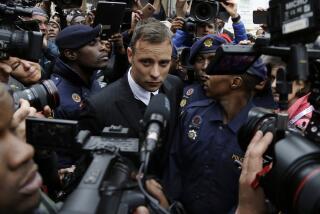Mandela’s Terms for Release Related by Wife : South Africa: He refuses to leave prison until the government ends the state of emergency and legalizes the ANC, Winnie Mandela says after a visit.
- Share via
JOHANNESBURG, South Africa — The wife of Nelson R. Mandela said Saturday that the black nationalist leader is refusing to leave prison until the government lifts its state of emergency, legalizes the African National Congress and allows exiled activists to return home.
Winnie Mandela’s remarks marked the first time anyone has suggested publicly that South Africa’s most famous prisoner has established preconditions for his own release. Anti-apartheid leaders and others who have visited Mandela say he wants to be free immediately and that the timing of his release is entirely in the hands of the government.
The government has announced its intention to release the 71-year-old prisoner, the most widely respected anti-apartheid leader among South Africa’s 26 million blacks, and says the only question is when and in what circumstances. Government sources have suggested that Mandela could be freed as early as next month.
But Winnie Mandela, speaking to reporters after a four-hour visit with her husband at Victor Verster Prison near Cape Town, said it is “quite clear problems have cropped up about his immediate release.” She identified the 3 1/2-year-old emergency and the ban on the ANC, the principal guerrilla group fighting white minority-led rule, as two of the major hurdles to her husband’s release.
“There is no question of him walking out of Victor Verster without those demands having been met,” because he would not be able to operate freely and effectively, Mandela said. She added that the government “has serious problems” meeting those conditions.
A Justice Ministry spokeswoman, Elsa Jones, said Saturday that she was not aware of any development that could delay Mandela’s release. “The government has said clearly that Mr. Mandela’s release is high on the agenda,” she said.
The conditions mentioned by Winnie Mandela closely parallel the pre-negotiation demands of the ANC, which include ending the emergency, freeing political prisoners, lifting the ban on the ANC and other anti-apartheid groups, allowing exiles to return to South Africa, and halting political trials.
President Frederik W. de Klerk has promised to open negotiations for “a new South Africa” in which whites and blacks would share political power, and the president has acknowledged the need to create a climate for those negotiations by removing restrictions on anti-apartheid activity. He is expected to present his first steps for racial reform at the opening of Parliament on Friday, and government sources say he intends to meet the demands of anti-apartheid groups slowly.
The release of Mandela, who has served 27 years of a life sentence for sabotage, is considered crucial to getting negotiations between the government and the black majority under way. Even moderate black leaders who are at odds with Mandela’s ANC have refused to negotiate until he is free.
In recent months, Mandela has met extensively with government officials and anti-apartheid leaders. He has expressed a desire to act as a facilitator to bring the two sides to the table, and he is expected to play an important role in those negotiations after his release.
After a meeting with her husband three weeks ago, Winnie Mandela, 53, told reporters that Mandela was upbeat and that his imminent release was “the real thing.” But on Saturday she said he was more subdued.
“While they (the government) are playing their games, they have forgotten that there is a family waiting for its head to come home,” she added.
More to Read
Sign up for Essential California
The most important California stories and recommendations in your inbox every morning.
You may occasionally receive promotional content from the Los Angeles Times.













